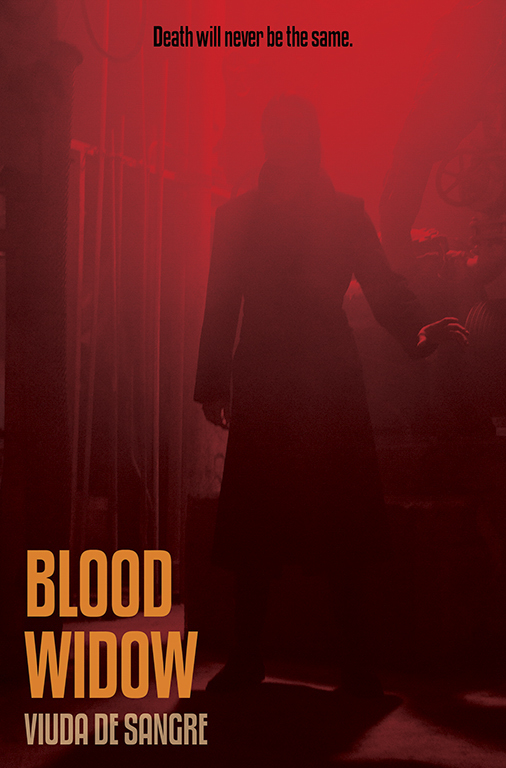BLOOD WIDOW is a Halloween Treat with a Supernatural Twist
by Jennifer Powers

Fall is when our movie watching fancy turns to the scary and unsettling. Shadows grow long in the late afternoon, and the extended nights summon us to explore the dark side of our imaginations. The chills are extra-special when the action takes place close to home.
In Blood Widow, filmed in and around Tucson, young women are disappearing. Detectives Valentine and Stokes suspect a serial killer and soon pick up a trail from terrifying events across the city. Unbeknownst to the detectives, the last survivor of a mysterious clan is feverishly searching for the same person, with dark plans of her own. Should she reach the killer first, the detectives will be dealing with an evil unlike any they have experienced.
Blood Widow was directed by Brendan Guy Murphy, who co-wrote the script with Dominic Ross. This is the third film for production company MurphySpeaking Films, founded by Brendan in 2007, the same year his first film, Limbo, was released. Story Time Fables came out in 2010 and was featured in the Arizona International Film Festival and the Stepping Stone Film Festival in India, and it was a semifinalist in the Oaxaca Film Festival in Mexico.
Recipient of the 2008 Buffalo Exchange Arts Award, Brendan says he was inspired to make Blood Widowwhen he began to wonder what would happen if a malevolent supernatural evil encountered a morally evil madman. “The idea turned into a treatment, the treatment became a script, and as the right cast of characters came off the pages, it was time to make the film,” says Murphy.
Shot on location in Southern Arizona, Blood Widow taps into some of the psychic power embodied in Hotel Congress, El Rancho Diablo, and the Slaughterhouse—all of which have infamous stories in their histories, from gangster hideouts to murder. The three are also long rumored to be haunted. Danny’s Baboquivari Lounge, Petroglyphs, and Gentle Ben’s Brewing Company generously agreed to allow their businesses to be used by the filmmakers as well.
“Tucson and its surrounding areas are filled with wonderful filming locations,” says Murphy. “We were fortunate to have been granted access to numerous settings that created the unique texture and sense of place that anchors the film.”
As an actor, Murphy has been featured in many films, commercials, and music videos, including Lucky U Ranch, Wastelander, and the Alex Italics award-winning short film Sheltered Love. In Blood Widow, he surrounds himself with a diverse cast of players, primarily from Tucson, who bring an authentic Southwest feel to the movie. Melissa Alejandra, born in Sonora, Mexico, and raised in Tucson, is a dancer/singer/choreographer who has performed nationally and internationally. Dallas Thomas has acted in film, web series, commercials, and onstage, including multiple appearances with the stellar Rogue Theatre Company. Hector Ayala, a native Tucsonan, has appeared in several films and made numerous appearances with Borderlands Theatre.
Veteran actor James Craven, whose resume includes a long list of television and movie credits, has appeared on Broadway and in the European tour of Gospel at Colonus with Morgan Freeman. The Minneapolis-based actor is a long-time member of the Penumbra Theater Company there, where he has appeared in more than 35 shows.
There is a wealth of local talent behind the camera, too. Art director Cori DiSimone and makeup artist Sonia Campbell work their dark arts to magically eerie effect. Director of photography Antonio Villagomez and sound mixer and editor James Wan came to Arizona from Ecuador and Hong Kong respectively. They combine to create a thrillingly atmospheric cinematic chiller. Dan Singleton composed the film score.
Blood Widow was produced by Brendan Guy Murphy, Sergio Kardenas, Antonio Villagomez, and Scott Hellon and is distributed by Indican Pictures through Lionsgate Studios. It is available for streaming on Amazon Prime and for rent and purchase on Amazon Prime, Google Play, YouTube, Apple TV, Fandango Now, Vudu, and Microsoft.
This year, make Blood Widow your Halloween date for a good, frightening time in Tucson. Death will never be the same.
Blood Widow trailer:






Also find us on...